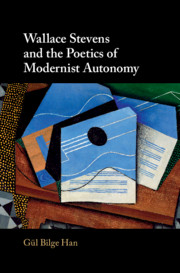Book contents
- Wallace Stevens and the Poetics of Modernist Autonomy
- Wallace Stevens and the Poetics of Modernist Autonomy
- Copyright page
- Epigraph
- Dedication
- Contents
- Acknowledgments
- Abbreviations
- Introduction
- Chapter 1 The Politics of Aesthetic Separation
- Chapter 2 Spaces of Autonomy
- Chapter 3 Community and Autonomy
- Chapter 4 Autonomy and Philosophy
- Coda
- Bibliography
- Index
Chapter 2 - Spaces of Autonomy
Relational Place-Making
Published online by Cambridge University Press: 17 June 2019
- Wallace Stevens and the Poetics of Modernist Autonomy
- Wallace Stevens and the Poetics of Modernist Autonomy
- Copyright page
- Epigraph
- Dedication
- Contents
- Acknowledgments
- Abbreviations
- Introduction
- Chapter 1 The Politics of Aesthetic Separation
- Chapter 2 Spaces of Autonomy
- Chapter 3 Community and Autonomy
- Chapter 4 Autonomy and Philosophy
- Coda
- Bibliography
- Index
Summary
Chapter 2 traces the ways in which Stevens explores the autonomy and social function of poetry by constructing built environments and architectural archetypes. It discusses a wide range of poems from Ideas of Order and The Man with the Blue Guitar to highlight how Stevens engages in issues of poetry’s autonomy and its social function by means of making up places for poetry. His spatial formations operate with an impulse to project an independent aesthetic territory. Far from an instance of aesthetic indifference, the impulse to demarcate a separate space is motivated by a desire to envisage new forms of engagement with the period’s unsettling cultural and sociopolitical circumstances. The chapter teases out these forms of engagement in Stevens’ approach to the cultural debates over a “usable past,” his exploration of citizen-state relationship, his treatment of the poet’s fláneuresque connection to the city, and his vision of poetry’s relation to community.
Keywords
- Type
- Chapter
- Information
- Wallace Stevens and the Poetics of Modernist Autonomy , pp. 65 - 93Publisher: Cambridge University PressPrint publication year: 2019

